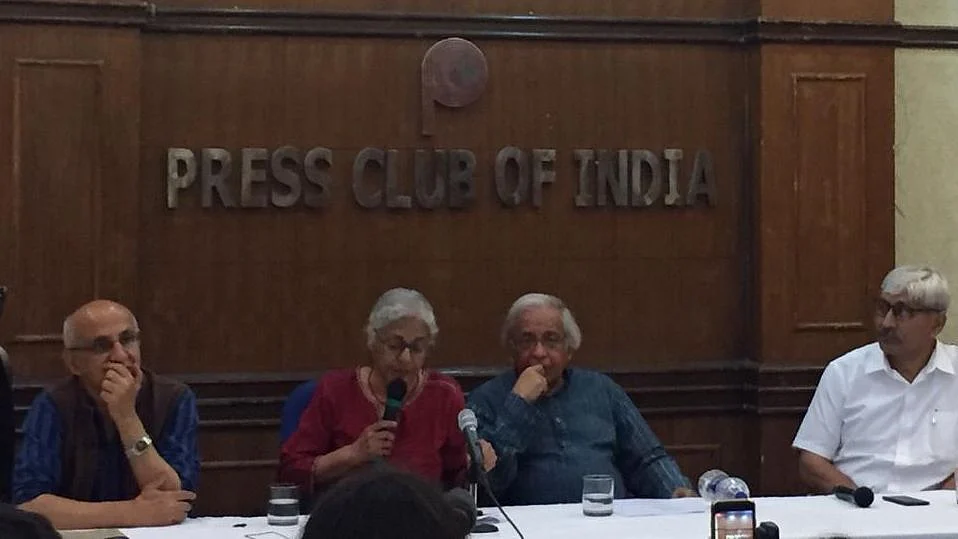If people can’t express anguish with poetry, then what’s the country coming to: Harsh Mander on Miya poets
In a meeting organised to express solidarity with Miya poets of Assam, activist Harsh Mander, author Githa Hariharan, poet Ashok Vajpeyi and educationist Apoorvanand condemned the FIRs against poets

“The Indian republic has crossed a new line into its descent into darkness by criminalising Miya poets who are simply putting forth their lament and dissent in Assam. Even Bhakti and Sufi poetry were dissent poetry. We would be impoverished without such poetry,” said a concerned Harsh Mander, a social activist and a retired bureaucrat.
A series of police complaints have been filed against Miya poets and activists across Assam accusing them of various crimes. The poets Hafiz Ahmed, Shalim M Hussain, Abdul Kalam Azad, Rehna Sultana, Ashraful Hussain have been named in many of these police complaints for simply writing poetry in their tongue articulating their identity, isolation and selfhood. Miya poetry has emerged as a tool of resistance, confrontation and empowerment. It echoes the fears of a community threatened by social and systematic discrimination as well as the looming threat of exclusion from the National Register of Citizens.
The word ‘Miya’ literally means gentleman in Urdu, but the Bengali-origin Assamese Muslims have realised that in Assam, Miya is a slur meaning “Bangladeshi” or “illegal immigrant”.
Nine of these poets have been charged with Section 153 A of the Indian Penal code and it deals with “Promoting enmity between different groups on grounds of religion, race, place of birth, residence, language, etc., and doing acts prejudicial to maintenance of harmony.”
“What happens when you police poetry. You are cutting off ethical markers with which we see the world around you. This poetry has been called a threat to Assamese people and to national security. We must express solidarity,” observes Githa Hariharan, an author and social activist, at a solidarity meet organised in the Capital.
This poetry has been around for decades, and in June 2019, Karwan e Mohabbat released a video online titled “I am Miya – Reclaiming identity Through Protest Poetry”. This video triggered a backlash all over Assam and several TV channels organised prime-time debates to question the validity of the feelings expressed in the poetry.
“It is as if there is a difference being Assamiya and Miyas. People who have been living there for decades have to prove that they belong there. We must understand why they have decided to write in their language and not Assamiya,” points out Apoorvanand, a professor and social activist.
Explaining their isolation, Hariharan points out that this is an attack on freedom of speech. “This is to target and crush protest and dissent. This dissent poetry proves the power of resistance in dignity politics. The objective is to break a united opposition to NRC. We must resist all attempts to call our citizens outsiders,” asserts Hariharan.
“Terror accused Pragya Thakur, Home Minister Amit Shah or UP Chief Minister Adityanath have not been charged with it even after their hate-inciting speeches during the election. But these people have been,” highlighted Mander.
Amit Shah has said that the NRC will be implemented across the country. “This has been done to target mostly Muslims,” points out Mander.
If people can’t even express their anguish with poetry, then what is the country coming to, asks Mander.
Underlining the poetry, culture critic and poet Ashok Vajpeyi said, “First of all, this is such good poetry. When people who are suffering write such good poetry in their language, the democracy must come together to support them. The job of poets is to slam and criticise.”
Taking a dig at the proceedings in Parliament, Vajpeyi quipped that these days one can’t even disagree in Parliament. At least that should be alive in the sphere of arts and culture. A lot of othering is going on. Several people are creating a false dichotomy of Us Vs Them. We are them and they are us. The language of the earth is same everywhere,” underscores the septuagenarian.
“In Hindi itself there are 40 dialects. There is no language which doesn’t depend on one dialect. There are 730 languages in India. If a major language is not used by a group of poets, then it must think that it is not proving them enough space and opportunity for them to speak and express themselves. In ‘Pahadi’ language, there are 23 words to describe smell and in Hindi, three or four words,” says Vajpeyi.
Underling the fact that they were prepared to defend and support the poets in every way possible, Mander also said that they knew that the persecution would go on for a very long time. Nine of the poets have been granted anticipatory bail.
“We must understand this in the backdrop of NRC. Almost 4 million people will be without a state. Nowhere in the world has there be statelessness of this kind. We do not have an extradition treaty with Bangladesh, so where will these people go? In the imagination of RSS, they see Muslims as second- class citizens. This is what they want,” ends Mander on a sombre note.
Follow us on: Facebook, Twitter, Google News, Instagram
Join our official telegram channel (@nationalherald) and stay updated with the latest headlines
